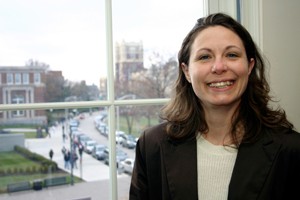
English Professor Awarded Interdisciplinary Ethics Grant
Assistant Professor of English and Comparative Literature Lisa Meloncon has been awarded a one-year, $10,000 interdisciplinary clinical/translational research ethics grant from the Center for Clinical and Translational Science and Training (CCTST).
The Ethics and Perceptions of Appalachian Americans to Genetic Research is a collaboration between Meloncon and Erin Haynes, an assistant professor of environmental health from the College of Medicine.
The grant is a result of work Haynes and Meloncon collaborated on in Marietta, Ohio. It started as
by Haynes that looked at correlations between air quality and the health of local children, but it soon turned interdisciplinary when Melonconin a smaller, side granttook over the communication components to create, build and write the studys Web site.
In their preliminary collaborations, the researchers discovered the Appalachian population was wary to participate in the study because of misconceptions about genetics.
Any time the word genetics came up in the community, the perceptions were wildly construed as negative, as something people were scared of and something they didnt understand, Meloncon explains. It was a tremendous problem for researchers who needed the consent of these individuals to participate in these studies.
In the CARES study, participants were asked to store blood for future genetic testing. The consent forms that presented this information to the participants, approved by the Institutional Review Board, only yielded 69 percent of consenting individuals. But when the forms were presented in a more conversational manner with practical terms, 93 percent consented to storing their blood for genetic researcha recruitment increase of 24 percent.

Erin Haynes.
Without participants consent, you cant even complete the study, she says. The purpose of the grant from the clinical/translational unit is to find the most ethical language to explain to people predominantly from the Appalachian community to get consent and recruit participants for scientific studies.
Meloncon and Haynes plan to conduct a number of focus groups with members of the community to gauge reactions, thoughts and perceptions on a number of genetic-related words, such as genome and DNA. From there, they will create two instruments: a tailored recruitment document to inform the public of the new study, and a consent form that is comprehensible to the directed audience.
For professional writer Meloncon, the study seems a perfect fit for her academic interests: technical communication related to the environment and medicine.
It fits into my research goals about the way information is moved from specialist to non-specialist, she says. People who are not exposed to high levels of scientific informationthey think gene and genome and collapse them into something they dont understand, and therefore something theyre not in favor of.
By communicating effectively with members of the community, Meloncon and Haynes will be one step closer to educating those potential participants about the importance of conducting such research studies.
In this case, Haynes and Meloncon want to look at the role of genetics in susceptibility to diseases related to manganese, a chemical element that can be toxic with overexposure. The Appalachian town of Marietta is home to the only manganese refinery in the United States and Canada.
The results of this grant, they hope, will help increase recruitment for further studies, not just about manganese exposure, but any and all with a genetic component.
We think its a great way to help us understand the barriers that go along with genetic research, says Meloncon.
To learn more about the Marietta research, visit:
Related Stories
UC offers experiential learning abroad in Central America
April 19, 2024
In the tropical paradise of Costa Rica, fourth year journalism and international affairs student Stephanie Rivera embarked on an unforgettable journey of self-discovery and cultural immersion. Leaving behind the familiar sights and sounds of Cincinnati, Rivera set out to study abroad for a transformative semester in this Central American country, rich with vibrant biodiversity and cultural heritage. The College of Arts & Sciences (A&S) at UC places great emphasis on encouraging study abroad and experiential learning opportunities for its students. Recognizing the transformative power of global experiences, the college supports a variety of study-abroad programs that enable students to enhance their academic pursuits while gaining valuable cultural and personal experiences.
Alabama.com: How a new self-test for HPV could be a game changer
April 19, 2024
The University of Cincinnati's Leeya Pinder was featured in an Alabama.com/Reckon article about how self-testing for HPV could make preventative care more accessible to those facing the most barriers.
WVXU: Test your word puzzle skills with a Cincinnati...
April 18, 2024
Cincinnati edition host Lucy May discusses the history and new found popularity of word games with Michael Griffith, professor English. Griffith is a writer, but also develops word games for publication.
